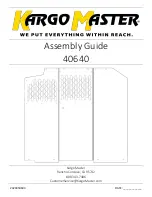
Hill Climbing
Hill climbing requires good judgment and a good under-
standing of your abilities and your vehicle’s limitations.
Hills can cause serious problems. Some are just too steep to
climb and should not be attempted. You should always feel
confident with the vehicle and your abilities. You should
always climb hills straight up and down. Never attempt to
climb a hill on an angle.
•
Before Climbing A Steep Hill
– As you approach a hill
consider its grade or steepness. Determine if it is too
steep. Look to see what the traction is on the hill side
trail. Is the trail straight up and down? What is on top
and the other side? Are there ruts, rocks, branches or
other obstacles on the path? Can you safely recover the
vehicle if something goes wrong? If everything looks
good and you feel confident, then change transmission
into a lower gear, shift the transfer case into 4LO (Low)
and proceed with caution. You should use first gear and
4LO (Low Range) for very steep hills.
•
Driving Up Hill
– Once you have determined your
ability to proceed and have shifted into the appropriate
gear, line your vehicle up for the straightest possible run.
Accelerate with an easy constant throttle and apply
more power as you start up the hill. Do not race forward
into a steep grade, the abrupt change of grade could
cause you to lose control. If the front end begins to
bounce, ease off the throttle slightly to bring all four tires
back on the ground. As you approach the crest of the hill
ease off the throttle and slowly proceed over the top. If
the wheels start to slip as you approach the crest of a hill,
ease off the accelerator and maintain headway by turn-
ing the steering wheel no more than a ¼ turn quickly
back and forth. This will provide a fresh
⬙
bite
⬙
into the
surface and will usually provide enough traction to
complete the climb. If you do not make it to the top,
place the vehicle in REVERSE and back straight down
the grade using engine resistance along with the vehicle
brakes.
WARNING!
Never attempt to climb a hill at an angle or turn around
on a steep grade. Driving across an incline increases
the risk of a roll over, which may result in severe injury
or death.
•
Driving Down Hill
– Before driving down a steep hill
you need to determine if it is too steep for a safe descent.
What is the surface traction? Is the grade too steep to
maintain a slow controlled descent? Are there obstacles?
368 STARTING AND OPERATING
Summary of Contents for 1500 2018
Page 4: ......
Page 10: ......
Page 13: ...REAR VIEW Rear View 1 Rear Lights 2 Tailgate 2 GRAPHICAL TABLE OF CONTENTS 11 ...
Page 16: ......
Page 99: ...Uconnect 4C 4C NAV With Automatic Temperature Controls 3 GETTING TO KNOW YOUR VEHICLE 97 ...
Page 108: ...Operating Tips Chart 106 GETTING TO KNOW YOUR VEHICLE ...
Page 168: ......
Page 170: ...BASE INSTRUMENT CLUSTER Base Instrument Clusters 168 GETTING TO KNOW YOUR INSTRUMENT PANEL ...
Page 380: ...Understanding The Features Of Your Winch Winch Components 378 STARTING AND OPERATING ...
Page 676: ......
Page 683: ...INDEX 12 ...
















































